he doesn't bite me like that
It’s 10pm on a Thursday and I’m walking around the back streets of Kensington.
I’m standing under a streetlamp, outside her building.
The light’s yellow, flickering in a way that makes everything feel slower.
She used to be a call girl and now she’s a spiritual healer.
This is Interview two, and I’m at her place.
I reach into my pocket for a cigarette. My hands are clammy.
I push the paper bag into my armpit while I light a cigarette. Jordanian dates. Pink champagne truffles.
It felt right earlier. Now I’m not sure.
I haven’t buzzed yet.
I’m just standing there. Smoking. Thinking.
Have I gone too far?

Marina Abramović. Role Exchange. 1975
“You know know we don’t have sex anymore”
In 2022, I started investigating love.
Everyone told me not to.
They said it was trite. Overdone. A beginner’s move. The kind of thing artists explore before they learn to think properly.
I wasn’t trying to be clever.
I just didn’t feel calm.
I understood myself. I knew how to regulate my emotions. I had done the work. But love still undid me.
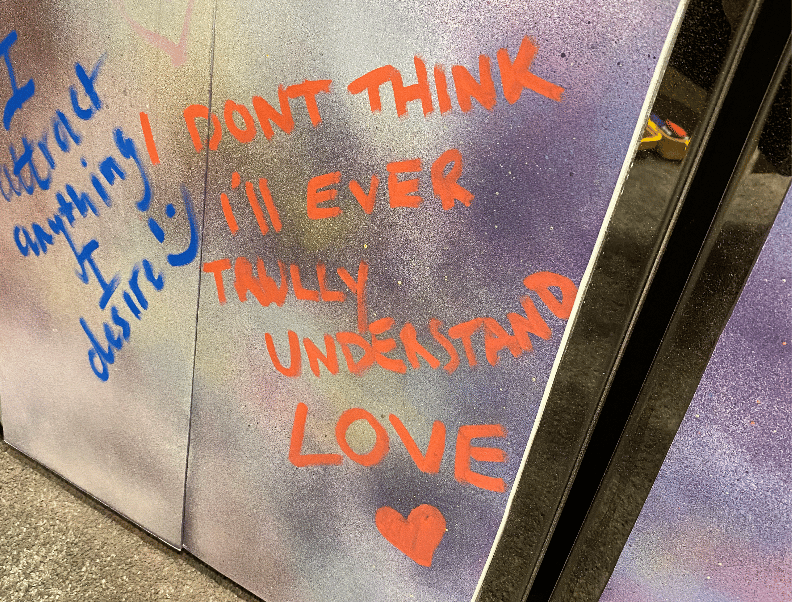
So I started asking questions to people around me.
Maybe it began during the show. Maybe before. I don’t remember exactly. But by the end of 2022, the conversations started changing.
People found me. Told me things I didn’t know how to hold.
They spoke about love in ways that broke open the world. And I wasn’t ready for it. But I had to keep listening.
If there is a purpose to the artist, it might be this
To take the emotional weight others can’t carry.
To metabolise chaos.
To make something from it.
Something others can use.
The artists I admire have all been through something. Some chased the extremes. Others were thrown into them. But they all had to process. Again and again and again.
Sometimes what they make looks like a product. A painting, a song, a sculpture. The market rewards it.
But sometimes, when you’re near them, you just know.
There’s no question of what they are.
Even if they never put it on a wall.
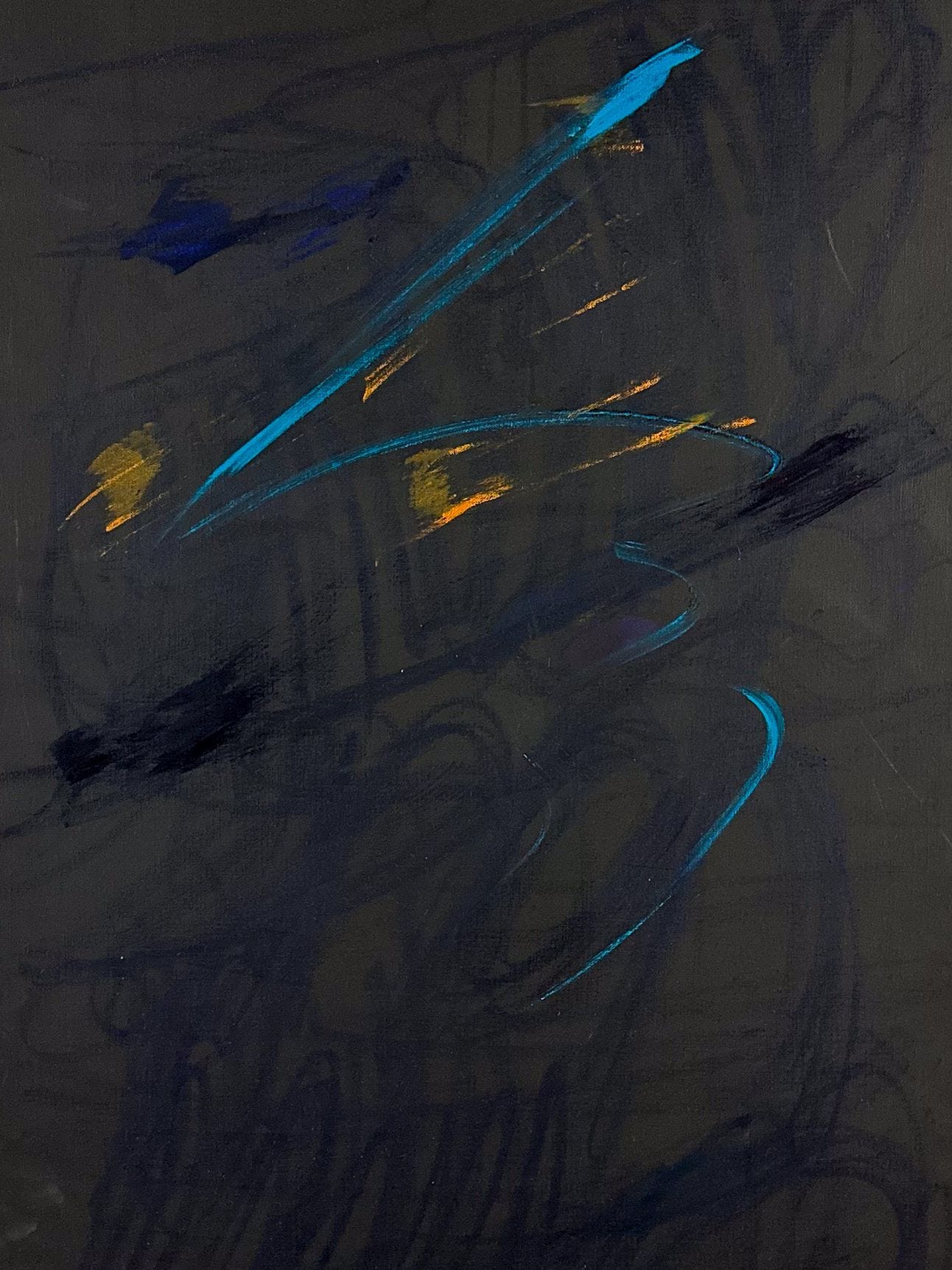
At the start, I spoke to people who were creative.
Designers. Artists. Musicians. People who had a language for beauty.
But over time, the stories started shifting.
They moved beyond the familiar arc of love and heartbreak. Beyond falling in love, breaking up, or getting divorced. The further I went, the more extreme the experiences became. People spoke about the death of parents, the loss of lovers, the kinds of emotional entanglements that didn’t fit the standard templates. This wasn’t heteronormative love. This wasn’t the dream of two kids, a mortgage, and matching holiday photos.
The people I met weren’t just outside the mainstream. They were living at the edge of it. And the edge wasn’t defined by class or money. It was about distance from the script.
They weren’t the people we see online. Or if they were, the version they showed me was something else entirely. Something softer. Less filtered. Almost private.
We live in a world that judges people by what they produce. How well they present themselves. How clean their Zoom backgrounds are. What they post. What they sell.
But the truth doesn’t sit in marketing stacks and pretty images online.
You stand next to someone and you know. You hear their voice and something inside you answers. Or doesn’t.
The digital space isn’t built for that. It rewards thought, not feeling. And thought is useful, especially if you want protection. Or profit.
But I don’t believe art comes from protection. I believe it comes from risk. From the heart.
That’s the space I wanted to live in.
Sure, I could’ve made a clean, intellectual project about love. Something tight. Something controlled.
But I didn’t want to study people. I wanted to feel them. To sit with someone I might never agree with. To let them disrupt me. To see what happens when you let someone into your world who might ruin it.
And I did.
That year, I was in a relationship. One of the best I’ve ever had. But the interviews cut through it.
Every conversation asked me to stretch. To hold someone else’s reality. And to do that, I had to shift myself. Just a little. Just enough to meet them where they were.
And that shift, those tiny changes I made for each person, I couldn’t explain them to the person I was with. I couldn’t figure out how to trust them to understand.
It felt like infidelity.
There were parts of me that only existed in those rooms. Versions of myself my partner would never meet. I didn’t share them. I couldn’t.
And slowly, that created distance. The kind that doesn’t fix itself.
But that’s what this work is. That’s what being an artist demands.
The art comes first.
Even above love.
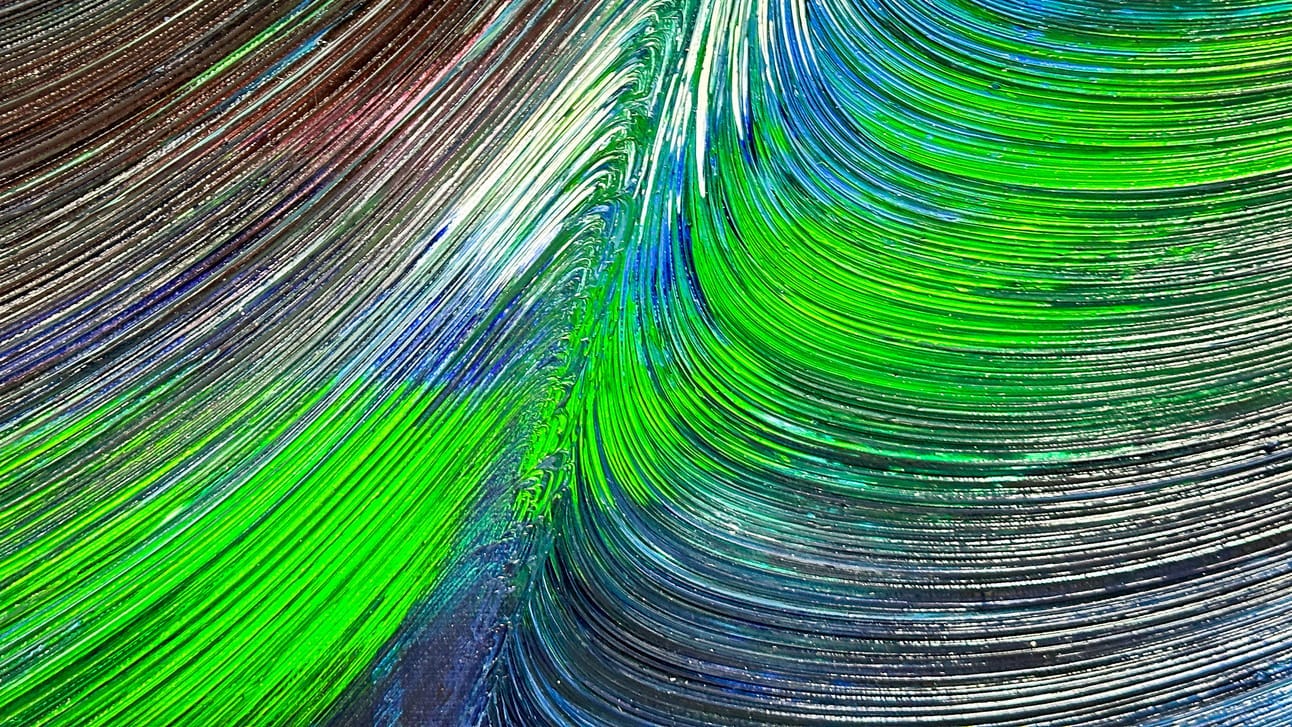
I had no idea what to do with the interviews.
Most days, I just tried to put myself back together.
That was the shape of the work, go speak to people, then make something. Something that helped me process what I was hearing. What I was feeling.
There were some rules. Not perfect ones. But they helped me stay grounded.
Rule one: everyone has the right to love how they want. accept everything.
Rule two: love changes identity, and identity changes how you love. If you can’t understand their love, change your identity. If you want their identity, change how you love.
Rule three: let them speak. Your views are irrelevant. You’re not there to help. You’re there to hear.
Were they conceptually sound? Probably not. I didn’t really know what I was doing.
After the twelfth interview, most of my time went into panic. I had to put myself back together. I started thinking about aftercare. About what I might be opening up in people’s lives without knowing how to close it.
So I turned to doctors. Psychiatrists. My own therapist.
But when the doctors started telling me about their own struggles with love, I realised I was on my own.
Some of the interviews stayed with me. I’m not going to publish them. That was never the point.
But over the next year, I’ll try to translate what I’ve learned. A distilled version. A shape you can hold. Maybe then, you’ll see how I think about these things.
But first, let me tell you about Josie.

I met her at a party.
She was dancing on a table at two in the morning. No alcohol in sight. That’s usually a good sign.
Twenty-six, maybe twenty-seven. Tall. Italian. Confident. Tattoos on her arms, but worn with elegance. Not loud. Just there.
We end up outside, sharing a cigarette. Her hands are steady. The air’s cold.
And I feel it, the same feeling I get in all the love interviews. A kind of charged connection. Almost attraction, but not quite. Like we’re not meant for each other, but something is still pulling.
When I was younger, I would’ve chased it. Believed it was fate. That we were about to fall in love.
But I’ve stopped doing that.
Now I understand it differently. Sometimes we’re just here to help each other. She had energy to give. I needed something to hold.
We start talking. She tells me how she ended up at the party. A few of her clients are here too, she says, nodding toward a table full of musicians, financiers, and glossy night people.
Then she turns back to me and says,
“I’m not a working girl.”
I hadn’t asked.
We agree to meet when we’re both back in London. I tell her what I do. We flirt, lightly.
Over the next few months, we keep in touch. I set the boundaries. We pick a time. I make the plan.
And then I go.
I’m tense.
Most of the people I interview are beautiful. That’s the truth. But it rarely reaches the level of real sexual danger. There’s a boundary. Even when it gets intimate.
But this time, the edge is sharper. There’s something different in the atmosphere. That closeness you reach when you talk about love for too long. The kind of openness that invites touch.
And it’s tempting. Not because it’s romantic, but because it’s unfinished. You want to find a way to answer it. To close the gap.
But I’ve learned to stay in it. To hold the discomfort.
The bite is the part that tells you who they really are.
Because love isn’t always kind. Some of the ways we love are ugly. There’s anger, control, shame, manipulation, deep grooves hidden beneath the surface. And until you see that part, you don’t really know how someone loves.
You don’t know where the care needs to go.
We tell ourselves we want to be loved gently. But most of us have something darker inside. Something we don’t show in passing.
That’s the work. To see it. To stay with it.
The truth is, these interviews aren’t always easy. They don’t always end cleanly. Josie, she was powerful. I didn’t know her full story, but I knew it was heavy.
So I went.
Not to fix her. Not to understand her.
Just to see what she was willing to show.

I knock on the door.
Wrong one.
I’m anxious. Just standing there, phone in hand, confused. I call her. No answer at first. Then it hits, this strange, low panic. Like being a kid again. That tight feeling in the chest before a first date.
Only I’m older now. Stable but helpless.
It’s easy for someone like me to be vulnerable. There’s not much that scares me anymore. I’m calm in most spaces. Physically, I’m fine. Nothing gets through unless I let it. If I need to process, I process. If I need to compartmentalise, I can.
But turning my belly up to the world still terrifies me. Because when I do, something always slips in deeper than it should.
This is one of those moments.
She calls. I step back into the street. Then I see her, running down the road barefoot, coat wrapped tight around her, waving.
I walk towards her.
Quick hug. No words. She grabs my hand and pulls me toward her flat.
We head inside. The light’s soft. Incense is burning. She hangs her coat on a hook by the door. Underneath, she’s wearing a silk dressing gown and lingerie. The scent of her perfume catches the air between us.
We move into the living room. It’s mostly bare.
Except for a large glass vivarium in the corner. Heated. Low-lit.
The TV looks untouched. She gestures toward the open garden door, where a joint is burning on a small silver tray.
She offers.
I take.
I hadn’t planned to get high tonight. But if that’s what she needs to connect, I’m fine. As long as I can pull myself back by the time I sleep, we can go as far as we need to.
We sit. Smoke. And she starts talking.
She tells me she’s been a spiritual healer for four years. Got into it after leaving the industry.
That’s how she refers to it: the industry.
She grew up in Italy.
A small village.
Not a lot of money.
Her mum noticed early on that men would pay to spend time with her.
That line won’t ever leave me.
I’ve got a good relationship with my mum. And hearing her say that, the way her mother looked at her, as a product, as potential income, cut through me.
She skips across the memory like it was nothing. Like it was weather.
She came to the UK after a few years of working in Italy. Running tricks, surviving. Eventually ended up in a high-end department store. Day job on the ground floor. Night job at a massage parlour. Partying, meeting clients. Living the London dream.
She tells me about a man. Someone as wild as she was. They found a rhythm for a while. But eventually, the old currents came back. The things she hadn’t faced.
She tries to get herself together.
She heads to India.
To an ashram in the north. The kind of place that takes in anyone. I know it. My family’s spent time in those spaces. This one sounded rough.
And it’s hard to imagine her there. A 24-year-old girl, undeniably beautiful, sleeping beside people losing their minds, living off nothing.
I glance around her living room. Designer boxes. Luxury packaging. Paris, Milan, London - a growing collection.
She sees me looking.
“You can be spiritual and dress well,” she says.
She’s not defensive. She just knows who she is.
I start to wonder why I’m here. Why she said yes.
So I ask her.
“Why am I here?”
By now, I’m mostly comfortable. We’re sat close on the same sofa. Our bodies touch, but the intimacy is resolved. No tension, just comfort in the connection. More like how you end a night out with a friend - tired, open, still processing.
She gets up to dims the lights.
The light from the vivarium begins to fill the room.
“Do you like snakes?” she asks.
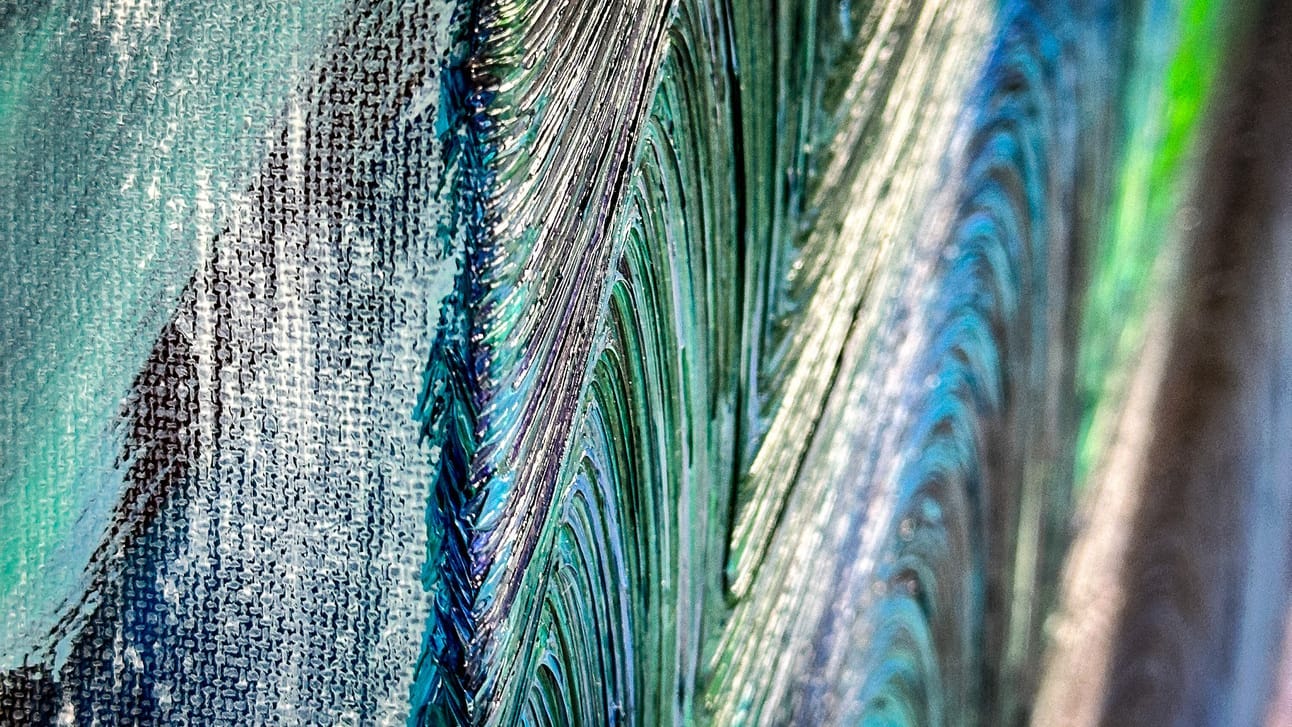
She walks over to the vivarium.
The warm yellow light illuminating her against the wall
She reaches in and pulls out a long milk-white python.
At first, I think it’s fake. She handles it like an object. Like a baton.
Then she wraps it around herself and comes to sit back on the sofa.
That’s when I realise - it’s real.
The last time I saw a snake was in the back countries of Kenya. I’ve never held one. And now it’s inches from me.
She drops into the cushions beside me, effortless. The snake drapes across her shoulders, and I’m suddenly aware - this is someone who knows how to control emotions.
I don’t know if she’s testing me, teasing me, or just playing.
But I do know this: I’m no longer in control.
My belly’s upturned.
It’s a vulgar display of power, and I respect it.
She stares at the snake, slow and soft, and I can tell,she’s communicating. Not out loud. Not with words.
But with presence. With care.
From the outside, it looks like love. Or at least affection.
And the snake responds. I don’t know how to read it, but it mirrors her energy. Calm. Watchful. Alive. Almost loving.
I push the obvious questions out of my mind.
Is it dangerous?
But we’re not operating on normal lines of danger. Not hers. Not mine.
“Is it a boy or a girl?” I ask.
“It’s a boy,” she says.
“Does he bite?”
“He can,” she says. “But he doesn’t bite me like that.”
“And if he did…”
“Do you think I’d like it?”
She makes eye contact
as she hands him to me.
she begins to teach me how to hold him.
How to let him move over me, not to grip too tight.
He’s heavier than I expect. Smooth. Cool. Alive.
His body feels like one continuous muscle. Strong. Elegant.
And suddenly, I understand.
I see what she sees in him.
Power without violence. Movement without fear.
For most of my life, I thought snakes were evil.
Biblical. Dangerous. Wrong.
But here she is - someone who’s faced human evil up close-
Showing this animal love.
And watching it return.
It’s beautiful.
Something folds inside me. Something small. Quiet.
A little tear builds at the edge of my eye.
The room is charged, yes. It’s sexual. It’s layered.
But that isn’t what gets me.
It’s the tenderness.
My mask tries to stay in place. Tries to hold posture.
But she sees it. She sees me.
And I know she knows I see her too.
“his name’s habibi”
We breathe.
It creates some space.
Together.
And without saying much more, we go lie down on the carpeted floor of the bedroom.
We build a pillow fort.
One of us upside down. One the right way round.
Like kids.
And that’s where she begins to tell me who she is.
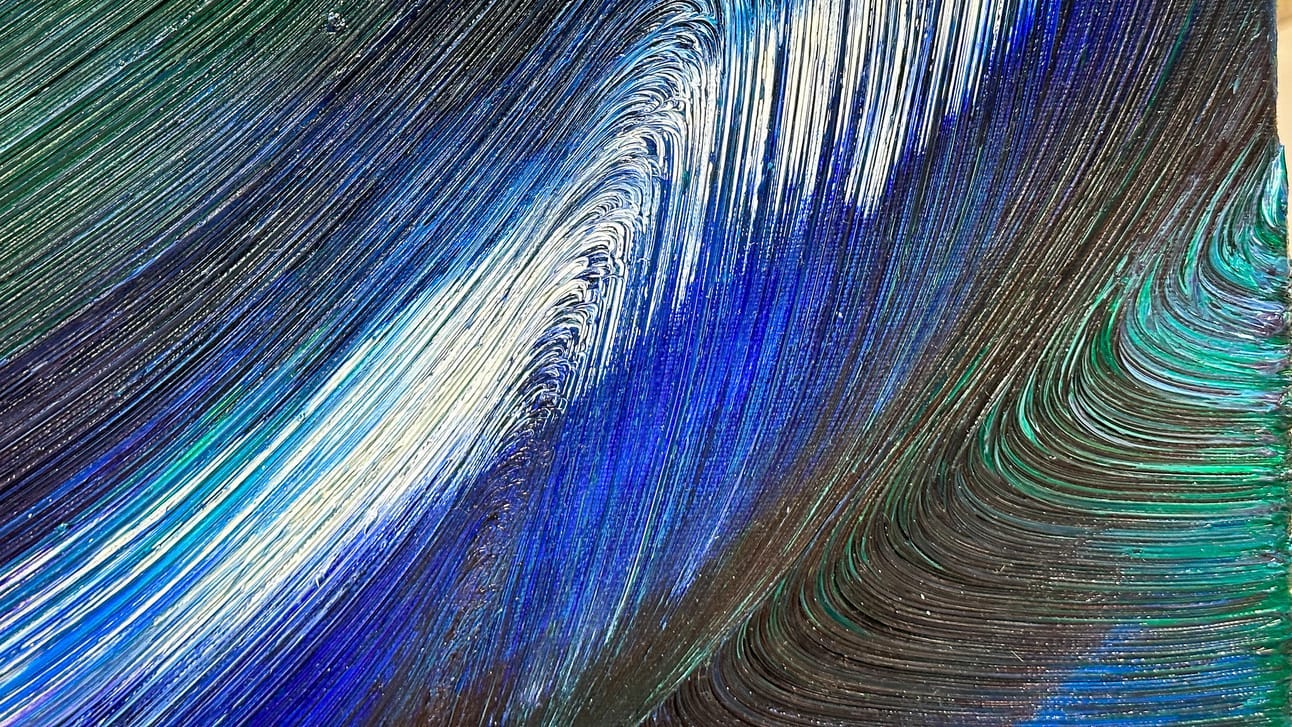
Most people define right and wrong along some timeline.
This is what I should do in a business deal to improve my odds.
This is what I should do in a lifetime to maximise my experience.
This is what I should do to make sure I go to heaven, or avoid hell.
The more long-term the view, the more consistent the behaviour.
And with consistency comes the ability to swallow risk. Volatility. Change.
Her perspective seemed to be consistent.
She sees love as a challenge she was given.
and this lifetime as a test to see if she could cope.
If she can pass through these challenges, feel everything, survive it, and still love the world, maybe she doesn’t have to come back again.
The path of the healer.
The final trials before release.
She’s been building her practice for a few years now. Quietly. Patiently.
And she’s finally ready to step into it full-time.
She wants to show people that physical and emotional love are still possible, even after deep violation. Even after darkness. Especially after darkness.
That trust can be relearned. That touch can be safe again.
It takes strength to choose love when you’ve been broken by it.
Most people stay on the pain or the money.
Most people never come back from that kind of wound.
Some never even step into it.
Some are hurt too early, too badly, and never return to touch at all.
And here she was.
Trying to lead.
It broke my heart.
Not because I pitied her. It just made my own search feel small.
I was just a dude interviewing people about love.
I felt childish.
And she was living it. Transforming it. Giving it back.
Didn’t know how to hold that much weight.
Even hearing this, I knew I was taking on more than I could carry.
I just wanted to get through the night.
Part of me wanted to break down.
Part of me wanted to give her everything.
A long hug and a short nap with her head on my chest felt like a good start.
We wake up a few hours later.
She’s still there.
Something had changed.
She felt more like a little girl than an intimidating woman.
I brush the hair off her face and wake her up.
We make tea. Sit in the kitchen.
It’s peaceful.
I feel proud.
Proud to see there are people like her.
To see how she’s growing.
How she’s looking at the world.
And that’s when the hard part begins.
I know I’ll see her once more. Just once.
To show her what I’ve made.
Then we’ll separate.
Different paths. Different rhythms.
If there’s one thing I’ve learned, it’s that you never know the shape of something until it’s gone.
Until you lose it.
Until you realise you can’t have it again.
The loss is part of the gift.
And the idea of losing her, after this
It hurts.
It’s supposed to.
But until I figure out how to not make it hurt, this is it.
This is the game.
So I have to get better at playing it.
And make sure they’ve got whatever they need from me.
I have a few minutes left.
Time to process.
Time to figure out what I could bring home, and what I have to leave behind.
Time to figure out how to tell her we can’t be friends.
And this is,
for the most part,
goodbye.
I never know.
It feels like too much.
Feels like I’m cutting off a part of myself too soon.
Then I hear it.
“I don’t think we need to see each other again.”
She wraps her arms around me.
Head buried into my neck.
I feel the tears press against me.
We exchange thank yous.
Final glances.
And then the door closes.
I spend the next few weeks putting myself back together.
Making things to fill the void.
Trying to shape what was now missing.
Now, a few years on, I understand the process a little more.
But even now, it hurts.
That pain gets deeper every time.
Maybe it always will.
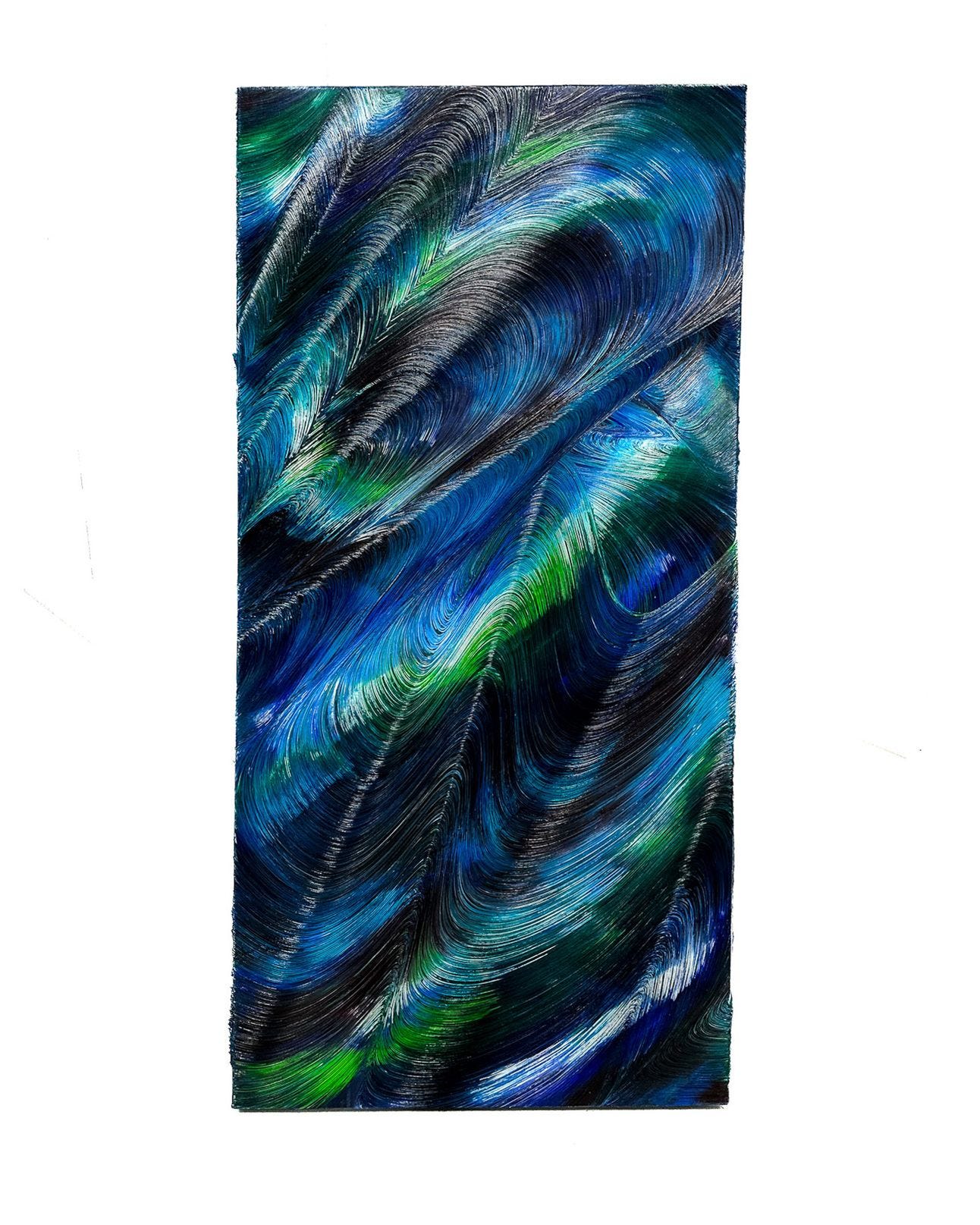
Habibi (2022-3)
Oil on Linen
140×70cm
Poet’s Corner
Untitled Bite
Apples falling apples
falling sliced on blades
balloons and bursting
water falling apples
clamping teeth
and mortal cores
of pips and poisoned apples.
- Thomas May
Time to start growing…
I love you loads.
Russ
x
If you’re curious about how I wrote this week’s newsletter, here’s my process
Set Topic (Bite - 10 weeks ago)
Research/thinking (Saturday)
Realise I’ve been writing the wrong topic (Sunday 2pm)
Thomas from Poets Corner reminds me that the topic is Bite
No time for memes
Panic about what to write about
Think about that snake (3pm)
Write
Insert Poets corner
This section (5pm UK)
Cry a little
Proof read (5.30pm)
Send
Thanks for getting this far, I’m blown away.
I’ve made some cool items as merchandise. If you click here, you can take a look.
Also, it’s 30% off for you because you read my work - it should load automatically.
It’s like reverse censorship or something.
You’re awesome
x


